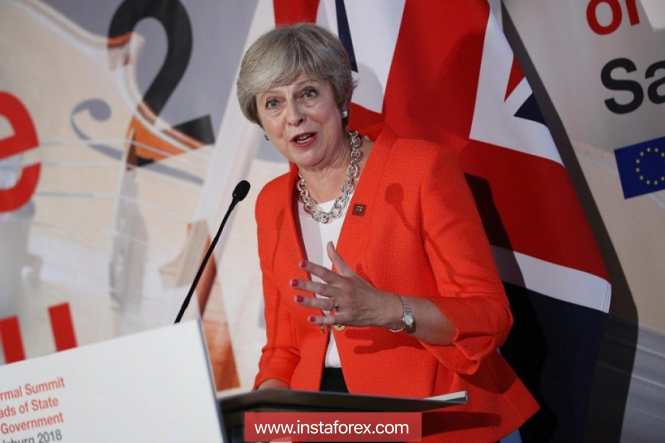The autumn political season in Britain started, which will be one of the "hottest" since the historic referendum in 2016. MPs have returned from a three-week vacation and are preparing for the most important Brexit vote on the eve of the key EU summit, which will be held on October 17.
In anticipation of such momentous events, passions run high, as Britain, by and large, is faced with a choice: either to support Theresa May's plan, or risk having to withdraw from the EU without a deal. The British Prime Minister, in turn, found herself between a rock and a hard place: on the one hand – intractable Brussels, which rejects almost all the proposals of London, on the other hand – the "hawk" wing of conservatives, for which even minimal compromises are unacceptable, not to mention significant concessions. Such a tangle of fundamental factors exerts strong pressure on the pound, which is entirely dependent on the Brexit issue.

The stumbling block has a name – Chequers plan. This plan was presented in the country residence of the Chequers (hence the name) in July, and since then disputes around it have not subsided. The main positions of the government scenario assume the creation of a free trade zone with the European Union, which in the future should be transformed into a common customs territory with the EU. May at the same time insists on restricting the freedom of movement of citizens of the European Union and Britain – a full-fledged border should appear between the UK and the EU countries. As for the central problem – the Irish border – the prime minister proposes to soften the conditions of the border regime, but at the same time it does not explain the mechanism for the implementation of this regime.
To the disappointment of Theresa May, the Chequers plan was not supported by many members of the Conservative Party, not to mention Labour Party and the representatives of Brussels. According to some conservatives, the prime minister went on about the Europeans, in many ways softening her position. After the informal summit in Salzburg, criticism of May has intensified-according to the "hawks", the European Union has turned from a club "for mutually beneficial interests" into a prison, the wardens of which do not allow Britain to leave the Alliance on the terms proposed by the British.
But the position of Europeans succinctly and concisely defined the head of the European Commission Jean-Claude Juncker: "it is Impossible to leave the Union, but to continue to enjoy its benefits." In other words, many conservatives rejected the Chequers plan because they thought the position was too soft. Brussels also considered this project unacceptable, even taking into account the innovations that may considers concessions. As a result, there is an ongoing criticism of Theresa May from both conservatives and the Labour Party, as well as a deadlock in negotiations with the European side.
It is for this reason that about forty deputies from the Conservative Party are not going to vote for the Chequers plan, in a vote that will take place in the near future (the exact date has not yet been determined). This statement was made today by one of the parliamentarians Steve Baker. If his information is correct, it will be a disaster for Theresa May, because in this case we will have to rely only on the votes of the Labour Party, whose representatives have already managed to say that they will vote against any deal proposed by the Conservatives.
On the one hand, the figure of "40" in the context of the number of conservative deputies opposed to Theresa May is quite justified, since so many legislators signed the initiative on impeachment of the prime minister not so long ago. On the other hand, after the conference of the Conservative party in Birmingham, the general mood among the deputies could change: at least, the issue of impeachment is not yet discussed. Theresa May in paints spoke about the negative consequences of the country's exit from the EU without a deal, stressing that the "Chequers" is the only working scenario that should be counted on.

Although in fact, there are alternative scenarios: the most discussed of them is the "six point plan", authored by former British Foreign Minister Boris Johnson. Former colleague May offers the so-called "Canadian version", according to which London will conclude a deal with Brussels, similar to the agreement on a comprehensive free trade area (SETA) between the European Union and Canada. It also proposes to move Brexit to autumn to hold new negotiations on the terms of the "divorce process".
This option also has its flaws. According to experts, the Canadian model is not universal in its essence and in the context of relations between London and Brussels will only aggravate the situation of the British: from the decline in the labor market and ending with additional trade barriers. In addition, the option proposed by Johnson does not solve the problem of the Irish border, which indicates its rejection by Brussels.
Thus, if Theresa May convinces the British Parliament that the alternative to the "bad Chequers plan" is only the absence of a deal and the prospect of complete chaos, the deputies are likely to support it. Otherwise, they will be responsible for the negative consequences of chaotic Brexit, including on themselves.
The victory of the bulls of the GBP/USD pair depends on May's victory. Today's dynamics of the pair shows that it is impossible to talk about medium-term or long-term forecasts: traders' mood changes in just a few hours or even minutes. Today, the pair overcame the 100-point path in half an hour, recovering from 1.3035 to 1.3140. Therefore, it is inappropriate to talk about technical analysis in this context, given the fact that the main negotiator Dominic Raab is speaking in the British Parliament in the evening. In addition, one of the US news agencies in the afternoon reassured traders: according to them, the parties were able to find a compromise on the Irish issue, and it is likely that the pilot project of the future transaction will be ready by next Monday.

But it is worth emphasizing that the agreement between London and Brussels is just the first part of the "Ballet de la Merlaison" - in order to conclude a deal, it is necessary for London to negotiate with itself, demonstrating agreement even among deputies from the Conservative Party.
Such an unreliable fundamental background reduces the level of predictability of the GBP/USD pair: for even one newspaper headline can now easily change the direction of the pair. Macroeconomic indicators are completely drowned out by Brexit, so in the coming days the pair will respond only to the news of the" divorce process", which is virtually impossible to predict the tone.
The material has been provided by InstaForex Company - www.instaforex.com